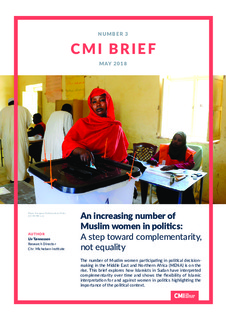| dc.contributor.author | Tønnessen, Liv | |
| dc.date.accessioned | 2018-06-01T14:00:47Z | |
| dc.date.available | 2018-06-01T14:00:47Z | |
| dc.date.issued | 2018-05-01 | |
| dc.identifier | oai:www.cmi.no:6534 | |
| dc.identifier.citation | Bergen: Chr. Michelsen Institute (CMI Brief no. 2018:3) 6 p. | |
| dc.identifier.issn | 0809-6732 | |
| dc.identifier.uri | http://hdl.handle.net/11250/2500074 | |
| dc.description.abstract | The number of Muslim women participating in political decision-making in the Middle East and Northern Africa (MENA) is on the rise. This brief explores how Islamists in Sudan have interpreted complementarity over time and shows the flexibility of Islamic interpretation for and against women in politics highlighting the importance of the political context. | |
| dc.language.iso | eng | |
| dc.publisher | Chr. Michelsen Institute | |
| dc.relation | CMI Brief | |
| dc.relation | 2018:3 | |
| dc.relation.ispartof | CMI Brief | |
| dc.relation.ispartofseries | CMI Brief no. 2018:3 | |
| dc.relation.uri | https://www.cmi.no/publications/6534-increasing-number-of-muslim-women-in-politics | |
| dc.subject | Women in Politics | |
| dc.subject | Peacebuilding in Africa | |
| dc.subject | Complementarity | |
| dc.subject | Sudan | |
| dc.title | An increasing number of Muslim women in politics: A step towards complementarity, not equality | |
| dc.type | Report | |
